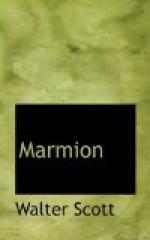line 7. ’The Iol of the heathen Danes (a word still applied to Christmas in Scotland; was solemnized with great festivity. The humour of the Danes at table displayed itself in pelting each other with bones, and Torfaeus tells a long and curious story, in the History of Hrolfe Kraka, of one Hottus, an inmate of the Court of Denmark, who was so generally assailed with these missiles, that he constructed, out of the bones with which he was overwhelmed, a very respectable intrenchment, against those who continued the raillery. The dances of the northern warriors round the great fires of pine-trees, are commemorated by Olaus Magnus, who says, they danced with such fury, holding each other by the hands, that, if the grasp of any failed, he was pitched into the fire with the velocity of a sling. The sufferer, on such occasions, was instantly plucked out, and obliged to quaff off a certain measure of ale, as a penalty for “spoiling the king’s fire."’-Scott.
line 33. Scott, after explaining that in Roman Catholic countries mass is never said at night except on Christmas eve, quotes as illustrative of early celebrations of the festival the names and descriptions of the allegorical characters in Jonson’s ’Christmas his Masque. ’The personages are Father Christmas himself and his ten sons and daughters, led in by Cupid. ‘Baby-Cake,’ the youngest child, is misprinted ’Baby-Cocke in Scott.
line 45. Post and pair, a game at cards, is one of the sons of Father Christmas in Jonson’s Masque. He comes in with ’a pair-royal of aces in his hat; his garment all done over with pairs and purs; his squire carrying a box, cards, and counters.’
line 55. The reference is to the ancient salt-cellar, which parted superiors from inferiors at table.
line 75. ’It seems certain that the MUMMERS of England, who (in Northumberland at least) used to go about in disguise to the neighbouring houses, bearing the then useless ploughshares; and the GUISARDS of Scotland, not yet in total disuse, present, in some indistinct degree, a shadow of the old mysteries, which were the origin of the English drama. In Scotland, (me ipso teste,) we were wont, during my boyhood, to take the characters of the apostles, at least of Peter, Paul, and Judas Iscariot; the first had the keys, the second carried a sword, and the last the bag, in which the dole of our neighbours’ plum-cake was deposited. One played as a champion, and recited some traditional rhymes; another was:—
...."Alexander,
King of Macedon,
Who conquer’d
all the world but Scotland alone.
When he came to
Scotland his courage grew cold,
To see a little
nation courageous and bold.”




